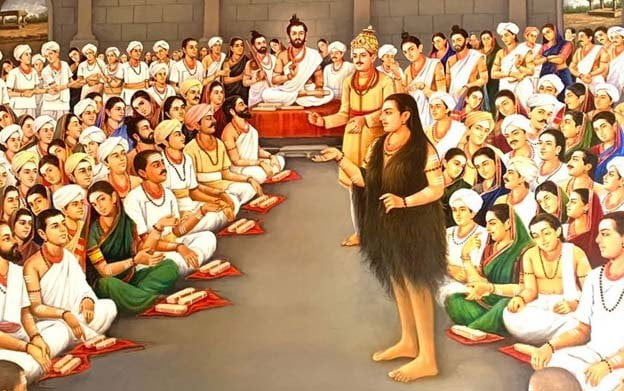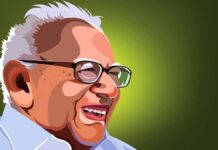Basavanna (1105-1167 CE) was a 12th-century philosopher, statesman, and social reformer from Karnataka, India. He founded the Lingayat sect and was a prominent figure in the Bhakti movement. His poetry, known as vachanas, often criticised social inequalities and religious orthodoxy.
Born into a Brahmin family, Basavanna was taught the Vedas, Shastras and the Upanishads. But he rejected both his caste and its scriptures and said that the spiritual experience of the labouring classes would be the well-spring of his social movement. Most of the things that Basavanna did was to turn Brahminical beliefs on its head.
Basavanna founded the Anubhava Mantapa, a hall of spiritual experience, where people of all segments —cobblers or sex workers —could articulate their thoughts. In his times, women were not only considered ‘second class’; they were also denied the right to offer worship. Basavanna, however, gave women equal status in his movement. To bring the social movement closer to the people, Basavanna and all the other Sharanas voiced their concerns in simple Kannada so that even laypeople could comprehend them. Basavanna asked everyone to not only share their lived experiences but also to share the fruits of their labour. This had a two-pronged purpose. Sharing the fruits of their labour and participating in community dining encouraged a feeling of kinship, overcoming caste and class barriers.

Basavanna was way ahead of his time. When there was significant discrimination based on caste, gender, and class, he and his contemporary Sharanas strived for an egalitarian society. When blind faith was the order of the day, they spoke about rationalism. When feudalism was the accepted structure of society, they spoke about a shared existence. No wonder Basavanna is considered by many as India’s ‘First Free Thinker’.
Basavanna is renowned for his vachanas -poetic writings that convey spiritual and philosophical messages. One such vachana, The Rich Will Make Temples for Siva, offers a poignant critique of religious and social practices, urging a deeper, more personal form of devotion. Worship of God in India is varied, and people from different localities have diverse rituals and conventions. Homogenising everything to an almighty at a particular place is highly undemocratic. It is not necessary to visit temples to feel the presence of God. Only the rich people will be able to build massive temples and make pilgrimages. In this context, it is essential to recover the local traditions.
Basavanna addresses the topic of God and worship in this poem. He states that the rich people make temples for Siva and asks what the poor must do to prove their faith. Rich people have the means to finance temples, but the poor do not. So, the poet asks what alternative the poor have to show their devotion. He gives the solution offered by saints everywhere: make the body itself a temple. Different parts of the body are other parts of the temple structure. The legs are pillars, the body is the shrine, and the head is a cupola of gold.
The people dedicate their lives to God by making the body a temple. The inner temple of the body is far superior to the material temple. Temples built by humans do not stand forever. The temple of the body shall remain for generations. People will carry devotion in their bodies. It is important that he is not invoking the Siva of Kashi or Kailasa. The poet calls to his chosen deity- the Siva of his locality, Lord Siva at Koodalasangama, the lord of the meeting rivers in Karnataka.
Summary
The poet desires to please God by building a temple for him but is a poor man and hence cannot do so. He wonders in anguish whether he will ever be able to please God.
The poet decides to treat his own body as a temple, with his legs as pillars, his body as the shrine and his head as a cupola of gold. He consoles himself by saying that ‘things standing shall fall’, meaning that buildings will be destroyed by wind, rain, and sunshine.
He is happy that ‘the moving ever shall stay’, meaning that he can carry the ‘temple‘ and his ‘God‘ forever with himself, so it will never be destroyed. It shall ‘stay’.
Basavanna wrote the vachana at a time when people other than high caste people or Brahmins could not enter temples.
Theme and Message
The primary theme of the poem is the contrast between external, materialistic displays of devotion and internal, personal piety. Basavanna critiques ostentatious displays of wealth in religious practices and advocates for a more personal, internalised form of devotion. It challenges the notion that spiritual merit can be bought or displayed through material offerings.
Imagery and Symbolism
Basavanna employs powerful imagery to convey his message. The comparison of the human body to a temple is particularly striking.
- Legs as pillars suggest stability and support, emphasising the foundational role of one’s actions and life choices in their devotion.
- Body as the shrine symbolises the sanctity of the human form and the idea that true worship comes from within.
- Head as a cupola of gold elevates the mind and intellect as the pinnacle of one’s spiritual life, covered in the most precious of materials, gold, indicating the value of pure thoughts and intentions.
The imagery culminates in the final lines, “Things standing shall fall, / But the moving ever shall stay,“ which encapsulate the transient nature of material structures versus the enduring nature of true, internal devotion. The “things standing“ symbolise physical temples and otherworldly constructions subject to decay and destruction. In contrast, the “moving“ refers to the dynamic, living practice of personal devotion that remains constant and enduring.
Philosophical and Spiritual Insights
Basavanna’s poem reflects his deep philosophical and spiritual insights. As a leader of the Bhakti movement, he emphasised direct, personal experience of the divine over ritualistic practices. This vachana embodies his belief in the divine’s accessibility to all individuals, regardless of their social or economic status. By suggesting that one’s body can be a temple, Basavanna democratises religious practice, making it available to the poor who cannot afford grandiose displays of piety.
Tone
The poem’s tone is questioning and slightly defiant. It challenges established norms and expresses a personal struggle with conventional religious practices.
Structure and Form
The poem is a short, free-verse composition typical of Basavanna’s vachanas, known for their simplicity, directness, and depth. The lack of a rigid structure or rhyme scheme allows the poet to focus on the profound content of his message. The conversational tone, particularly in the address to “O Lord of the Meeting Rivers,“ gives the poem a personal and intimate feel.
The Rich Will Make Temples for Siva remains relevant today, as it addresses the universal human tendency to equate material wealth with spiritual merit. Basavanna’s critique challenges readers to reflect on their own practices and motivations. In an era where religious displays often serve as markers of social status, his message calls for a return to sincerity and humility in spiritual life.
In Kerala, too, there were Ezhuthachan and Poonthanam, as Akka Mahadevi and Basavanna in Karnataka. Those saintly poets addressed the temple-centred worship of the Brahmins and the class, caste, and gender issues of their period. They resisted the exploitation of the poor in the name of religious worship by imagining alternatives. The rich make temples for Siva, the poor make their bodies into temples, and the poor have to show their devotion.
The Rich Will Make Temples for Siva is a profound piece that critiques materialistic expressions of devotion and advocates for a more personal and internalised spirituality. Basavanna underscores the impermanence of physical structures and the enduring nature of genuine devotion through simple yet powerful imagery and a clear, direct message. His work inspires and challenges readers to seek a deeper, more meaningful connection with the divine.






























